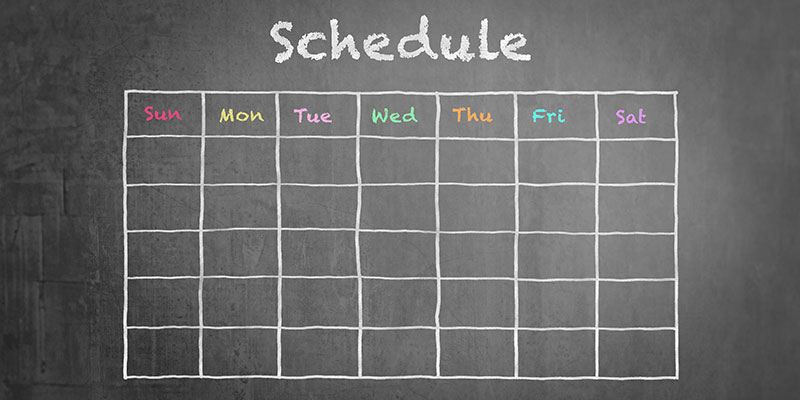The Importance of a Well-Planned Study Timetable
A significant turning point in Singapore's educational system is the Primary School Leaving Examination (PSLE). It evaluates students' proficiency in Primary 6 in the four fundamental subjects of English, Science, Mother Tongue and Mathematics. Meticulous planning is needed to achieve AL1 (Achievement Level 1) during the PSLE online revision process.
As parents, you must look for efficient ways to help your kids prepare for the PSLE. The revision can become manageable and easier with the right strategy. A revision timetable is crucial for streamlining study sessions and improving productivity. Students can efficiently handle their time, prioritise their learning goals, and strike a balance between their academic work and other responsibilities by using a PSLE study timetable. Let us discuss here how to create a timetable and why they're essential.
A well-organised study schedule is vital for a number of reasons:
- Proper time management: The timetable guarantees that students spend enough time on each subject and cover all necessary material before the exam.
- Steady progress: The timetable encourages consistent, gradual improvement, which enables students to develop their abilities and knowledge slowly without feeling overwhelmed.
- Setting goals: With clear objectives and deadlines in your child’s study schedule, you give your child a sense of direction and purpose.
- Deadlines: Having a study schedule before tests or deadlines provides a clear path to follow. Your child can devote more time to thorough studying and preparation, making sure they are prepared.
- Stress reduction: Understanding that there's an organised approach in place helps students feel less stressed and more motivated to study.
- Improved focus and concentration: An established schedule for what to study, when and how long will help kids focus and concentrate better. As a result, they become less prone to become distracted or lose time contemplating how to proceed.
- Make students disciplined: A timetable sets rules for what to do after achieving one goal, making students disciplined even when not conscious. A student will inculcate being organised if they maintain discipline in their studies.
- Helps students avoid procrastination: Timetable continually encourages students to finish the task or activity within a specific time limit and move on to the next one. This helps students overcome procrastination.
- Balanced lifestyle: Study schedule ensures students set aside time for relaxation, exercise, and leisure—essential activities for preserving general well-being and avoiding burnout.
The Roadmap to Academic Success: Your Child’s Study Schedule
Here is a step-by-step tutorial for creating a PSLE study schedule.
Sort by priority
Don't give each topic and subject the same amount of time. Prioritise the hardest and most important ones, and make your child spend more time on those than on others. They must also understand that it is essential to put in extra effort and practise those particular subjects or topics to score better.
Wisely manage your child’s time
Select the most effective time to study after calculating the amount of time the student will be required to dedicate to each topic and subject. For instance, some students prefer studying after a one-hour lunch break. In contrast, others might start their homework after taking a quick nap because they will likely feel active. Make your child stick to it as soon as you determine what works best for them.
De-stressing
Your child should plan breaks in between their scheduled revisions. These breaks for relaxation are helpful since they allow your child to de-stress and improve their concentration while revising. These rest periods shouldn't last longer than 30 minutes and shouldn't be planned too frequently. During the PSLE year, it's advisable to restrict family vacations to brief durations. It's essential to remember that they need not feel guilty about spending time with their family, provided they have a well-structured revision schedule in place and stick to it.
Strategizing for PSLE Success- A Day-by-Day Plan
A systematic and methodical approach is needed when planning a study schedule to gain an Achievement Level 1 (AL1) in the PSLE. This study plan is intended for students who have a solid grasp of the core subjects and wish to improve their performance to a higher level. Here is a recommended everyday study schedule for your child to get an AL1 in their PSLE:
Morning session
- Wake up- 6:00 AM
- Breakfast - 6:30 AM
- Go to school - 7:30 AM
Mid-morning session
- Go home and eat a small snack - 2:30 PM
- Learn English for one hour - 3:00 PM
-
- Concentrate on learning vocabulary, grammar, and reading comprehension.
- Essay and situational writing practice.
- 15-minute break - 4:00 PM
Noon session
- Learn Mother Tongue for one hour - 4:15 PM
-
- Concentrate on learning vocabulary, grammar, and reading comprehension.
- Essay and situational writing practice.
- Engage in language enrichment, listening comprehension, and oral practice exercises.
- 15-minute break - 5:15 PM
-
- Learn Mathematics for one and a half hours - 5:30 PM
- Focus on problem-solving strategies, mental maths, and algebra.
- Complete practising problems and then focus on topics your child needs to improve.
- Dinner and then relax for one hour - 7:00 PM
Evening hours
- Learn Science for one and a half hours - 8:00 PM
-
- Concentrate on mastering scientific principles and concepts.
- Practise responding to both structured and open-ended queries.
- Review scientific procedures, studies, and experiments.
- 15-minute break - 9:30 PM
- Revision for 45 minutes - 9:45 PM
- Your child has to summarise what they have learned on that particular day.
-
- For quick review, make flashcards, mental maps, or charts.
- Determine which areas require additional attention.
- 30 minutes of relaxation - 10:30 PM
-
- Practise relaxation strategies, such as deep breathing or meditation.
- Your child has to organise the study materials for the next day.
- Sleep - 11:00 PM
Holidays and weekends
- Dedicate extra time to focus on specific areas that require improvement.
- Involve participating in group study sessions, seeking guidance from teachers through consultations, and practising with sample exams.
- Make sure to allocate time for your child’s leisure activities, spending quality moments with family, and taking breaks to relax.
Final words
To get AL1 on the PSLE, one must approach their studies strategically and systematically. Students can greatly increase their chances of passing the test by establishing clear academic goals, creating a regular study schedule, addressing their shortcomings, and emphasising review and practice. Your kid can have a clear plan for their daily study activities using the daily timetable. It encourages a methodical, planned learning approach, lowering stress and boosting productivity. Motivate your child to adhere to the schedule and modify it to suit their own learning needs. Feel free to check out Studysmart to help your child score better with the best PSLE online revision strategies designed exclusively for students of Singapore.

